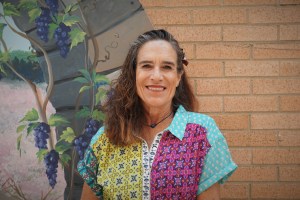Introduction
After reading Julia Wendell’s poems for the first time, I wrote in a note ‘These are the kind of poems I really enjoy.’ This initial reaction was only reinforced by the further rounds of readings and discussions on her work, especially “The Snake.” As the epigraph to the poem sourced from Emily Dickinson indicates, it dwells on human relationship with the natural environment and a larger spiritual question, often arising from this encounter. The snake, fondly given the ‘comfort name’ Wilhelmina after a childhood memory, is simultaneously familiar and strange.
In fact, throughout her poems, Wendell ignites our thought and delights us with her startling imagery. For instance, the possibility of Wilhelmina’s sudden appearance is a source of ‘heart-shudder,/ that visceral urgency to flee.’ Or consider, Wilhelmina’s body ‘question marking back and forth’. Or, in another poem, Peter staying ‘close, like a sea star/ I pocket, miraculously unbroken.’
I hope for these poems to move you, the reader, with the same visceral, miraculous charm and leave you still young enough for wonder.
— Asvin Vijayan
The Bombay Literary Magazine
The Snake
“But never met this Fellow,
Attended or alone,
Without a tighter Breathing,
And Zero at the Bone.”
. –Emily Dickinson
I’d stumble on him in the shed row,
behind a tack trunk, in the garden bed.
Relocation is what came to mind.
“He’s a good thing,” neighbor Paul said,
“keeps the rodents down.
“Give ‘im a comfort name, then go ‘bout your business.”
“How about Wilhelmina?” my husband offered,
for the woman who made
your favorite salad dressing, when you were a kid.”
I found the sinewy reptile coiled up in Calvin’s stall.
The horse side-eyed him,
then went back to munching his hay.
About some things, horses know more than humans do.
My husband pitchforked him into the shed row,
next to a fledgling barn swallow, fallen from its nest in the rafters.
One open-jawed gulp,
and the young bird slithered down its slim body,
still chirping and shaking a wing.
I saw a baseball, my husband saw the world.
“Kinder than if the cat had killed him,” he said.
I rustled up a feed bag and some baling twine.
There’s no explaining that heart-shudder,
that visceral urgency to flee,
when you spook at an old hose in the trash can, assuming it’s Wilhelmina.
I opened the bag, inched closer with my weapon like a gladiator,
and forked him up,
his body question-marking back and forth, dead-set against my decision.
I tried to act like a woman who was calm about it all,
Which clay road or cotton field would I take him to?
There’s so much I cannot live with or express.
Ghost Light, 2020
Those moments before nightfall,
when oaks get that leaden look—
dusky blue negatives of their former selves—
They are light stands on dark stages
promising the Odeon
will re-open.
I yearn for the curtain to part
on my back yard.
I am the ghost swinging from branches,
the stagehand kindling a lamp
to shine through the aside.
Opening night is incomplete
without the light.
Nude Descending a Staircase
. After Marcel Duchamp, 1912
He’d be through college now—
big hands, dark eyes.
Maybe he’d scrimmaged
hoops in high school.
Or obsessed over luna
and cecropia moths,
among the largest
of their kind
and shortest lived—
having unformed mouths,
the gorgeous anorexics
cannot eat.
He might have had
his own family by now
and gone sailing on weekends
where sand dollars are dark brown.
No matter.
Peter stays close, like a sea star
I pocket, miraculously unbroken.
“Hello,” he greets me
from the bottom of the stairs
as I descend each morning,
robotic and calculated,
trailing broken versions
of my naked past behind me.
I’m no longer so young
for wonder not to become
regret, to love and miss
what I never had.
Acknowledgements
 Image credits: Canadian Theatre Review. For the uninitiated, a ghost light is a “…small, single bulbed light, usually a floor lamp of some sort, that shines on the dark stage throughout the night when the theater is closed and unoccupied.”
Image credits: Canadian Theatre Review. For the uninitiated, a ghost light is a “…small, single bulbed light, usually a floor lamp of some sort, that shines on the dark stage throughout the night when the theater is closed and unoccupied.”
Contributor
Julia Wendell
 Julia Wendell’s sixth poetry collection, The Art of Falling, was published by FutureCycle Press in 2022. Another collection, Daughter Days, will be published by Unsolicited Press in 2025. She is Founding Editor of Galileo Press. She lives in Aiken, South Carolina, and is a three-day event rider.
Julia Wendell’s sixth poetry collection, The Art of Falling, was published by FutureCycle Press in 2022. Another collection, Daughter Days, will be published by Unsolicited Press in 2025. She is Founding Editor of Galileo Press. She lives in Aiken, South Carolina, and is a three-day event rider.

